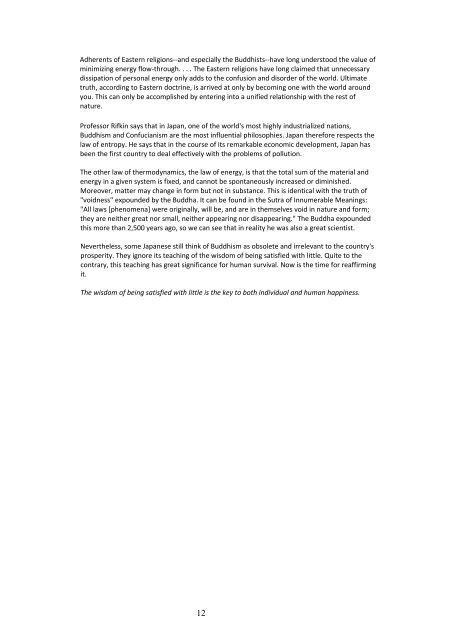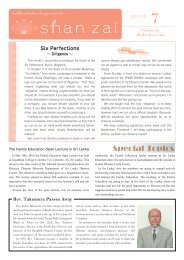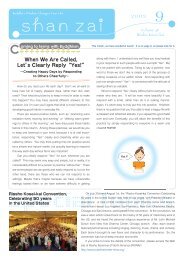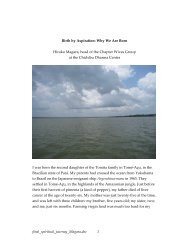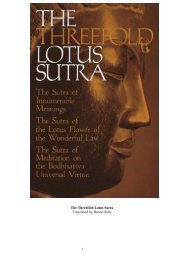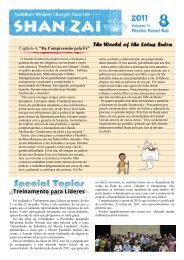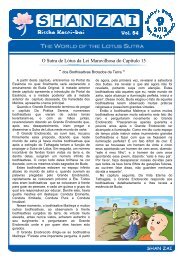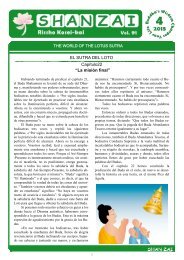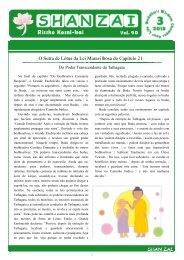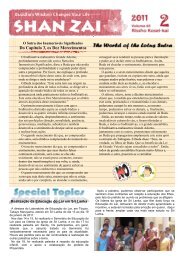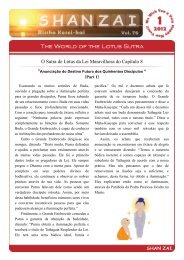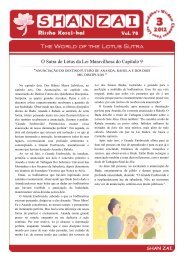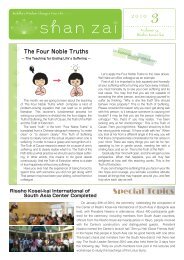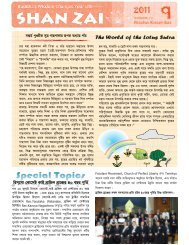Adherents of Eastern religions‐‐and especially <strong>the</strong> Buddhists‐‐have long unders<strong>to</strong>od <strong>the</strong> value ofminimizing energy flow‐through. . . . The Eastern religions have long claimed that unnecessarydissipation of personal energy only adds <strong>to</strong> <strong>the</strong> confusion and disorder of <strong>the</strong> world. Ultimatetruth, according <strong>to</strong> Eastern doctrine, is arrived at only by becoming one with <strong>the</strong> world aroundyou. This can only be accomplished by entering in<strong>to</strong> a unified relationship with <strong>the</strong> rest ofnature.Professor Rifkin says that in Japan, one of <strong>the</strong> world's most highly industrialized nations,Buddhism and Confucianism are <strong>the</strong> most influential philosophies. Japan <strong>the</strong>refore respects <strong>the</strong>law of entropy. He says that in <strong>the</strong> course of its remarkable economic development, Japan hasbeen <strong>the</strong> first country <strong>to</strong> deal effectively with <strong>the</strong> problems of pollution.The o<strong>the</strong>r law of <strong>the</strong>rmodynamics, <strong>the</strong> law of energy, is that <strong>the</strong> <strong>to</strong>tal sum of <strong>the</strong> material andenergy in a given system is fixed, and cannot be spontaneously increased or diminished.Moreover, matter may change in form but not in substance. This is identical with <strong>the</strong> truth of"voidness" expounded by <strong>the</strong> Buddha. It can be found in <strong>the</strong> Sutra of Innumerable Meanings:"All laws [phenomena] were originally, will be, and are in <strong>the</strong>mselves void in nature and form;<strong>the</strong>y are nei<strong>the</strong>r great nor small, nei<strong>the</strong>r appearing nor disappearing." The Buddha expoundedthis more than 2,500 years ago, so we can see that in reality he was also a great scientist.Never<strong>the</strong>less, some Japanese still think of Buddhism as obsolete and irrelevant <strong>to</strong> <strong>the</strong> country'sprosperity. They ignore its teaching of <strong>the</strong> wisdom of being satisfied with little. Quite <strong>to</strong> <strong>the</strong>contrary, this teaching has great significance for human survival. Now is <strong>the</strong> time for reaffirmingit.The wisdom of being satisfied with little is <strong>the</strong> key <strong>to</strong> both individual and human happiness.12
GratitudeFor <strong>the</strong> past two decades I have devoted myself <strong>to</strong> <strong>the</strong> activities of <strong>the</strong> World Conference onReligion and Peace (WCRP). The WCRP is a group of religious leaders from many countries whowork with one spirit for world peace. It has expanded its activities and promotion of step‐bystepprogress <strong>to</strong>ward world peace <strong>to</strong> include assistance <strong>to</strong> developing nations, service as aUnited Nations nongovernmental organization, and calls for disarmament at <strong>the</strong> SpecialSessions of <strong>the</strong> UN General Assembly Devoted <strong>to</strong> Disarmament. [The WCRP convenes asubstantial world assembly every four years and has held seven as of 1999. It has grown in<strong>to</strong> aworld organization for interreligious dialogue, with more than a thousand participants from 60nations.]When I reflect on how I have been able <strong>to</strong> devote what little talent I have <strong>to</strong> promoting <strong>the</strong>WCRP, what comes <strong>to</strong> mind is <strong>the</strong> help and kindness I have received from a truly wide variety ofpeople. Surrounded by my family and grandchildren and sustained by <strong>the</strong> assurance of beingable <strong>to</strong> rely on so many people, I can carry out my duties from one day <strong>to</strong> <strong>the</strong> next. If I look alittle fur<strong>the</strong>r, I can see that I am sustained by <strong>the</strong> efforts of kindred spirits not only in Japan butall around <strong>the</strong> world. I feel this from <strong>the</strong> bot<strong>to</strong>m of my heart.Just who was it that created me? Needless <strong>to</strong> say, it was my fa<strong>the</strong>r and mo<strong>the</strong>r. My fa<strong>the</strong>rworked hard every day in <strong>the</strong> fields, was <strong>the</strong> center of <strong>the</strong> harmony of our family, and engravedon my heart <strong>the</strong> importance of a life of honesty. My kind mo<strong>the</strong>r strained her frail constitutionworking constantly at household chores, caring for <strong>the</strong> silkworms, plying <strong>the</strong> loom, making gooduse of <strong>the</strong> slightest moment of leisure, and sitting at night by <strong>the</strong> hearth patching our clothing.Words fail <strong>to</strong> describe how indebted I am <strong>to</strong> all <strong>the</strong> teachers who have instructed me fromelementary school <strong>to</strong> <strong>the</strong> present day. It was my spiritual men<strong>to</strong>r, Sukenobu Arai (1879‐‐1949),who opened my eyes <strong>to</strong> <strong>the</strong> Lotus Sutra. It is impossible for me <strong>to</strong> imagine how different Iwould have been had I not met him. When I think about <strong>the</strong> great karmic connection thatallowed me <strong>to</strong> meet Arai, I can only put my palms <strong>to</strong>ge<strong>the</strong>r in a prayer of gratitude.When we s<strong>to</strong>p <strong>to</strong> think about it, we realize that we live surrounded by <strong>the</strong> affection of manypeople. Of course, <strong>the</strong>re are some who fling malice, hatred, or jealousy at us, but those who<strong>to</strong>uch our lives with warmth and friendship are certainly in <strong>the</strong> majority. This encompasses no<strong>to</strong>nly visible signs of love and words of kindness and encouragement from family and closefriends, but also <strong>the</strong> actions of many people whom we have met only once or twice, or whowere once close <strong>to</strong> us, who are concerned about us from afar and watch over us. When werealize this, <strong>the</strong>re arises in us a feeling of gratitude for even <strong>the</strong> invisible bonds among humanbeings.The woodblock artist Shiko Munakata (1903‐‐75), who carved out a world all his own, is said <strong>to</strong>have murmured while engrossed in carving his blocks, "Thank goodness, thank goodness. Thechisel is cutting along by itself." To whom was he so grateful? Probably not even he himselfknew exactly. Something invisible simply set his carving <strong>to</strong>ols in motion. Somewhere, along <strong>the</strong>boundary between consciousness and unconsciousness, he felt this invisible force and softlymurmured his gratitude. Surely at such a moment Munakata was completely happy.There is a strong tendency <strong>to</strong>day <strong>to</strong> give a logical explanation for everything and <strong>to</strong> deal withthings as matters of rights and duties. For example, some people think that when a parentraises a child, <strong>the</strong> parent is only obeying an animal instinct, so <strong>the</strong>re is no particular reason for<strong>the</strong> child <strong>to</strong> be thankful. Some think that it is only natural for teachers <strong>to</strong> teach, since after all<strong>the</strong>y receive salaries. Pursuing this line of thought, one concludes that plants give oxygen just13
- Page 1 and 2: Invisible EyelashesSeeing What is C
- Page 3 and 4: THE TWO FUNCTIONS OF A CELL 55The P
- Page 5 and 6: For this to take place, it is vital
- Page 7 and 8: Pleasure is filling the empty rice
- Page 9 and 10: Rose or Thorns?The rose is beautifu
- Page 11: The Contents of Hotei's SackThe mor
- Page 15 and 16: Looking Into the DepthsEach of us m
- Page 17 and 18: Self‐AwarenessSometimes we allow
- Page 20 and 21: the mountains, Po Chu‐i went to m
- Page 22 and 23: and hesitating to take a first step
- Page 24 and 25: "Nothing has an ego" means that all
- Page 26 and 27: self‐love, endeavoring to develop
- Page 28 and 29: ampant, Dr. Schweitzer devoted his
- Page 30 and 31: Everyone has some ability that is b
- Page 32 and 33: een pondering Kepler's theories of
- Page 34 and 35: improved, I would return home only
- Page 36 and 37: work.In another section, "The Daily
- Page 38 and 39: Hakone, I finished in fifty‐five
- Page 40 and 41: Many people want to work in their o
- Page 42 and 43: eplied, "One hundred divided by two
- Page 44 and 45: at the gate, the Buddha appeared an
- Page 46 and 47: once again sinks into despair, it t
- Page 48 and 49: individuality grows beyond the boun
- Page 50 and 51: this truth, one becomes keenly awar
- Page 52 and 53: suddenly turned irritable and said,
- Page 54 and 55: well in a sport, one obeys the rule
- Page 56 and 57: There is, however, one infallible r
- Page 58 and 59: The offering of kind words means sp
- Page 60 and 61: We must never think of ourselves an
- Page 62 and 63:
The Wind Blowing from the FutureThe
- Page 64 and 65:
Courage That Opens DoorsI have many
- Page 66 and 67:
"Even Insects Work and Eat"My paren
- Page 68 and 69:
Home Is More Than a HavenIn recent
- Page 70 and 71:
Where Affection and Gratitude Begin
- Page 72 and 73:
Forever Young at HeartAlmost every


